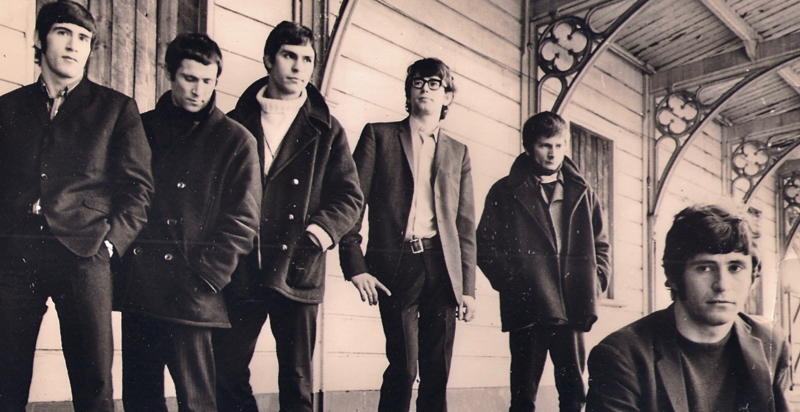
Simon Dupree & the Big Sound never made it big. The British band aimed for a career in blue-eyed soul, but managed only one recording of consequence. They hated it.
Singer Derek Shulman (there was no “Simon Dupree”) semi-famously dismissed their 1967 UK hit “Kites” as “utter shit.” Yet, crack open any modern compilation of British psychedelic music and you’ll likely find the song, still flying high after a half century.
With its operatic peaks and big-love lyrical sentiment, “Kites” feels like a Broadway number dragged into the underground — in the vein of Traffic’s “Feeling Good” — which makes sense, but isn’t so.
The song was the creation of the team of Lee Pockriss and Hal Hackaday, U.S. songwriters with assorted stage credits (mostly minor). Their pop-song credentials (acquired separately) include “Itsy Bitsy Teenie Weenie Yellow Polkadot Bikini,” “Johnny Angel” and “Let’s Go, Mets.”
“Kites” first surfaced in 1967 as the last single from the Rooftop Singers, a trio known for their brisk revival of “Walk Right In.” With “Kites,” Atco/Atlantic records house producer Arif Mardin seemed under the spell of Ennio Morricone, giving the ballad an ersatz cinematic wash.
Shulman and his two brothers in the band, understandably, wanted nothing to do with the Rooftop recording. Management heard its potential, though, and figured the song’s curious vibe could be mined for psychedelic gold.
The Shulmans’ “Kites” was recorded at London’s Abbey Road studios, home of the Beatles and ground zero for the UK’s underground sounds of 1967.
The number begins with the crash of a gong. A wind machine sweeps the musical landscape. Eric Hine’s “Chopsticks” piano riff waltzes its way to a stereotypical but effective “oriental” feel. A mellotron (apparently “borrowed” from the Beatles) and xylophone wend through the track. A sitar, perhaps.
Derek Shulman begins his vocals as if in a trance. We’re in a minor key. Of course.
I will fly a yellow paper sun in your sky
When the wind is high, when the wind is high
I will float a silken silver moon near your window
If your night is dark, if your night is dark
The song casts an effective spell, but ascends to greatness two-thirds through with the gong-accompanied entrance of Jacqui Chan, an actress friend of the band (screen credits included “The World of Suzie Wong” and “Cleopatra.”) Chan recites a brief passage of dreamlike love murmurs, in Chinese. Her sexy vocals anticipate the chart-topping steam heat of 1969’s “Je T’aime Moi Non Plus.”
The actress, however, was from Trinidad and didn’t speak her family’s language of origin. A local chop suey joint’s owner was recruited to write the Chinese words of love, and Chan’s grandmother reportedly taught her to recite them phonetically.
“It was all a bit of a farce, really,” guitarist Pete O’Flaherty has said. “They sound like erotic words, but nobody seems to know what they mean.”
The public didn’t share the band’s disdain for the track. Lightning stuck as the odd and addictive “Kites” cracked the top 10 in Britain. (The recording would not be heard widely in the States until the CD era.)
Simon Dupree & the Big Sound soldiered on for several singles, but even the late appearance of young Elton John (Reg Dwight) on keyboards couldn’t help. An air of desperation accompanied their 1968 release of “We Are the Moles,” a watery two-part psychedelic single credited to the titular band and dark-publicized as an uncredited Beatles effort. Didn’t work. Simon Dupree & the Big Sound disbanded the next year, and Shulman and his two brothers reinvented themselves as Gentle Giant, cranking out perky prog throughout the 1970s.
The Simon Dupree “Kites” saw its psychedelic credentials confirmed in underground compilations such as “The Psychedelic Years” (Knight Records, 1990), Rhino’s “Psychedelia: A 50 Year Trip” (2016), EMI’s “Psychedelia at Abbey Road” (1998) and “The Great British Psychedelic Trip” (See for Miles, 1993, 1986).
“Kites” the song found other string-holders. The Cyrkle of “Red Rubber Ball” fame recorded it as an instrumental for the sexploitation film “The Minx.” Finland’s Kirka and Israel’s Nikmat Hatraktor produced local versions. More covers came from Ultraviolet and the Associates.
But leave it to psychedelic overlord Arthur Brown to have the final word. The “Fire” singer recorded a cover in 2007, for his “The Voice of Love” album, following it up with an even stronger take in 2010, accompanied by this stunning and surreal performance video:
Ooh, I LOVED this when it came out. I was quite young. But I *still* love it. Very interesting to hear the story around it.
Just listened to this on radio 2, bringing back memories.I played it to a Japanese work colleague who didn’t understand the words.Now I know why, in Chinese.
I think Kites is a beautiful song with a very unique original melody. Thanks for sharing it.
This song has haunted me all my life – totally underrated.
THANKS for including the Arthur Brown version.
Thanks for jogging my memory. Great song.
Great song. On my play list.
Absolute Choon ….
Superb. Evokes a number of happy memories
The hidden mysteries of music. Band’s name rings a bell. There were 1000s of albums in 60s and early 70s.
Oh the band didnt like it but management did and management were right. A shining light from the fading summer of love that ticks all the boxes including
a Beatles connection to boot. By the way a superb video from Whitbys finest lunatic Arthur Brown all those years later.
The band Ultraviolet did a cover of it in 1990, not Ultravox.
https://youtu.be/kgM6qzVQWkw
Thanks, John. Fixed.